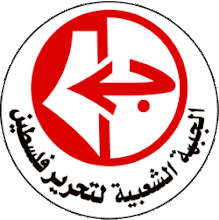The focus of the demonstration was on a call for the release of ALL Palestinian political prisoners imprisoned by the Israeli State - those 'convicted' in Israeli Military courts and those interned without trial under the 'Administrative Detention' regime.
The demonstration specifically focused on the cases of two prisoners - Ahmed Sa'adat, Secretary-General of the Popular Front for the Liberation of Palestine (PFLP) and Abdallah Abu-Rahmah, coordinator of the Bil'in Popular Committee Against the Wall. Also remembered at the protest was Bassem Abu Rahmah of Bil’in, a cousin of Abdallah’s, who was murdered by the Israeli military this time last year while protesting against the apartheid separation wall.
According to ADDAMEER, the Palestinian prisoners' rights organisation, more than 6,800 Palestinians are currently imprisoned by the Israeli state for resisting oppression and the apartheid system. Of those, 337 are children, including 37 under the age of 16. A further 15 are elected Palestinian representatives and almost 300 are 'Administrative Detainees', that is they have been interned without trial and have not been charged with any ‘crime’. 103 are anti-apartheid wall activists and human rights defenders. The 'convicted' prisoners were jailed by non-jury Israeli Military Courts (all Palestinians in the Occupied Territories [OPT] are subject to Israeli military law), which act as an arm of the Israeli state and cannot be considered – by any measure – to be fair in their treatment of Palestinians.
Over four decades of illegal Israeli military occupation, Palestinians from all walks of life have been illegally detained by Israel. Since the beginning of the occupation in 1967, over 650,000 Palestinians have been detained by Israel. This forms approximately 20% of the total Palestinian population in the OPT. Considering the fact that the majority of those detained are male, the number of Palestinians detained forms approximately 40% of the total male Palestinian population in the OPT. This is an astonishing figure and should be a cause of huge international concern.
The protest and rally outside the Israeli embassy yesterday was aimed at highlighting this reality and intended as an act of solidarity with the many imprisoned Palestinians. The IPSC was delighted by the large turnout, which was especially appreciated on a rare sunny day when most of the city was heading to parks or to the beaches. The attendance included people from all walks of life and several passers-by stopped to listen to the speeches. Members of Dublin’s Basque community also joined in, having postponed their own demonstration yesterday until next week in solidarity with Palestinian prisoners. There were also honks of support from many passing motorists.
First to speak was Mr Mac An Mhaistír, representing éirígí, who began by referring to why this country should have a particular empathy with Palestinian prisoners: “There is a strong tradition of solidarity between Irish republicans and Palestinians, especially when it comes to the issue of prisoners. The histories of both Ireland and Palestine are replete with the suffering of those imprisoned for their political beliefs and for resisting occupation. That political prisoners have been and continue to be a feature of the political life of Palestine and Ireland is emblematic of the failed nature of attempts to pacify an occupied people.”
He went on outline the savage treatment of Palestinians in custody and then focused on the case of Ahmed Sa’adat, general secretary of the Popular Front for the Liberation of Palestine: “Comrade Sa’adat was abducted by Palestinian Authority security officials in January 2002 at the behest of Israel and imprisoned without trial. In March 2006 Israeli forces laid siege to the prison before kidnapping Sa’adat and five of his comrades. Sa’adat, a member of the Palestinian Legislative Council, was finally tried by the Israeli state in the summer of 2008, and on December 25 2008, he was sentenced to 30 years imprisonment. He was convicted of membership of a prohibited organisation (the PFLP), holding a post in a prohibited organisation, and incitement, for a speech he gave following the Israeli assassination of his predecessor, Abu Ali Mustafa, in August 2001.” He called for the immediate release of Sa’adat and all Palestinian political prisoners.



pflp.gif)
No comments:
Post a Comment